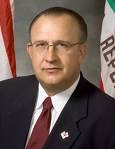This just in from State Senator Bob Dutton…
 Misguided Logic Drives Dangerous New Prison Plan
Misguided Logic Drives Dangerous New Prison Plan
The California Legislature is considering a dangerous new prison plan under the pretext of solving the state’s prison woes. And in support of this effort, soft-on-crime Democrats are wrongly heralding the recent Chino prison riot as proof why a radical revamp of California’s prison system is necessary.
The liberal logic goes something like this: overcrowded prisons, like the one at Chino, have created conditions so bad that unhappy prisoners behave poorly; therefore we should release prisoners early, cross our fingers and hope those remaining behind behave better.
It may seem bizarre, but such faulty logic is what’s wrong with a recent federal court order demanding that California reduce its inmate population of 160,000 by nearly 43,000 within the next two years.
What the liberals fail to grasp is that the prisoners in Chino didn’t riot because of overcrowding. It was a race riot, plain and simple—a riot caused specifically by a ruling made years earlier by the same federal courts who are now trying to let prisoners run free.
Prior to the court’s intervention, California’s prison officials used to separate prisoners to keep rival gangs like the Aryan Brotherhood, the Mexican Mafia and the Black Guerrilla Family from killing each other. But the federal courts changed all this when they tied the hands of prison officials by preventing this practice. It should come as no surprise when a riot occurs as a consequence of such illogical thinking.
Did you know that over the past decade California’s in-state prison population has actually decreased by more than 8,000 inmates? Claims of overcrowding rely on the assumption that every prisoner should have a private cell. Bleeding-heart liberals who would like to see these dangerous felons have a second, third, fourth and even a fifth chance conveniently ignore the fact that prisoners can and do safely share cells all the time.
California’s leftist lawmakers paid no heed to the facts in their recent push to enact sweeping prison legislation. Rather, under the guise of pursuing budgetary savings and complying with the whims of three unelected, out-of-touch federal judges, they ignored the reality of the situation.
The legislation, which would grant an unprecedented jailbreak for as many as 27,000 hardened felons, passed the State Senate on a narrow 21-19 vote. All Republicans and four Democrats opposed the measure. The measure is now being considered by the Assembly.
In their rush to enact the measure, the supporting lawmakers failed to adequately explain how thousands of felons are supposed to find gainful employment during the midst of the worst economic recession since the Great Depression. Unemployment in San Bernardino and Riverside Counties, the area I represent in the California Legislature, now exceeds 14 percent.
Not only does the legislation let criminals out of jail early, it also makes it harder to put them back. The bill guts the very sentencing laws that help law enforcement officials take dangerous criminals off our streets.
In addition, the measure establishes a constitutionally dubious “sentencing commission”—an unelected, unaccountable committee with unprecedented powers to change criminal sentences without legislative approval. If that isn’t disturbing enough, you’ll be comforted to know that one of the 13 members composing the commission will be required to be a convicted felon.
Felons are given their sentences for a reason: they’ve committed serious crimes that sent them to a state penitentiary. Justice demands that they serve their full sentence before being allowed back into society.
Has anyone even bothered to ask the victims or the victims’ families what they think of these proposed changes?
The simple reality is that California already has a sentencing commission. It’s called the Legislature. It is the job of the Legislature, not an unelected body, to determine the prison sentences California felons receive.
Certainly, California’s prisons are far from perfect, but any attempt to improve them should first and foremost protect public safety, not jeopardize it.
And if the goal is public safety, it’s hard to argue our current laws aren’t working. Tough-on-crime laws like Three Strikes have helped reduce violent crime in California by more than 40% since 1993.
California voters are concerned for their own safety and that of their loved ones. That’s why time and again they have rejected efforts that would undermine California’s tough sentencing laws. If given an opportunity, I’m confident they will reject these dangerous new proposals too.

